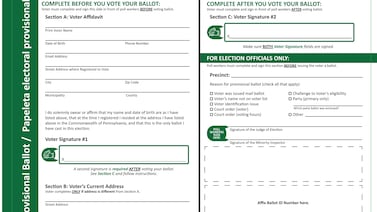Maricopa County is spending nearly $1,000 for each hour that a team of investigators works to find out what went wrong on Election Day in November, according to new information obtained by Votebeat.
The team — a retired Arizona Supreme Court justice, an election technology expert, the owner of a printer supply shop, and a lawyer — are studying why ballot tabulators at polling places across the county rejected thousands of voters’ ballots on-site that day, to come up with recommendations on how to prevent it from happening again. The problems caused headaches and delays for voters, and spurred GOP leaders to spread unproven allegations of corruption and fraud.
It’s unclear what the independent review, which began Jan. 1, will find that county officials don’t already know, in part because the county has not yet finished drafting its own account of what happened. Still, Supervisors Chairman Clint Hickman said he has always wanted the external review, regardless of what the internal report says, because it will show what happened from a neutral source.
The county says its elections director is still finishing an internal report of the problems, and has so far denied Votebeat’s request for the document, which was given to the county attorney’s office in December. The office also denied requests for related communications.
Hickman said he hasn’t checked in on the independent review being led by retired Arizona Supreme Court Justice Ruth McGregor or pressed for more details from the county’s internal report because he wants to wait for the final, comprehensive findings from McGregor.
“It’s truly independent,” Hickman said. “I don’t want anything to do with it other than what we need to do once we see it.”
County officials have repeatedly publicly stated that the printers the county uses to print ballots on demand was not printing toner darkly enough, causing the problems tabulating, but have said they don’t know why that problem didn’t show up in prior elections or during testing.
Overall, the printers rejected about 17,000 ballots on site, requiring voters to place them in a secure box to be tabulated later at the county’s central elections center. GOP candidates who lost their elections claimed that the problems caused voter disenfranchisement, given the long lines generated in some places. All cast ballots were counted, according to county officials and available data.
The experts on the team
County Attorney Rachel Mitchell, with the support of the county supervisors, hired McGregor on Jan. 1, agreeing to pay her $415 an hour. She put no cap on the number of people McGregor hired to help her, the hours she worked, or the total cost of the independent review, according to an agreement obtained by Votebeat.
McGregor brought on Neal Kelley, longtime former registrar of voters in Orange County and an election technology expert, for $200 an hour; Doug Meyer, owner of CTS Office Supply in Cottonwood, for $125 an hour; and attorney Sandra Thomson for $250 an hour, according to details provided to Votebeat by Jennifer Liewer, spokesperson for the county attorney’s office. Collectively, if all four team members work at the same time, the total hourly rate is $990.
Kelley confirmed his involvement to Votebeat on Friday, but said it wouldn’t be appropriate for him to comment further because the review is ongoing.
He was registrar of voters in Orange County from 2005 to 2017. He’s known across the country as an expert in ballot printing, having run an in-house ballot printing system that prints all of the county’s ballots. He’s served on numerous federal boards and committees to advise on election technology.
Kelley is one of the most well-respected election officials in the country, in part because of his high level of transparency, use of data, and expertise in contingency planning, said Tammy Patrick, CEO of programs for Election Center, who previously worked for Maricopa County Elections Department.
“He is well-known for his contingency plans, and I think that is what makes him a particularly good choice,” Patrick said. “He always had a number of things in place if something went wrong.”
The website for Meyer’s office supply store, CTE Office Supply, says that he and Barbara Meyer have been running the store since 1993. It offers printers, along with other office supplies, and tech services on printers, including the two types that Maricopa County uses, OKI and Lexmark.
What the public knows
Elections Director Scott Jarrett told supervisors just before they finalized the election results on Nov. 28 that their preliminary research found that the toner from the printers wasn’t adhering properly or darkly enough on the back side of the ballot.
“It was very perplexing to us why this was an issue, because we’ve stress-tested our ballot-on-demand printers,” he said. “We did it right before, as we were approaching, coming up to this election.”
The county sent technicians to around one-third of its 223 vote centers to deal with problems tabulating ballots on Election Day, according to a letter county officials sent to the attorney general’s office in late November.
The letter indicated county officials knew that “other common in-person voting factors” caused the tabulators to reject the ballots, forcing the voters to put them into the secure box known as “door 3.” It gave just one example: Of the 16,724 “door 3” ballots, nearly 1,600 could not be tabulated because the voter had used a ballpoint pen instead of using the county-provided felt-tip pen, or hadn’t completely filled in the ovals marking their selections.
A Votebeat analysis published in early December found that the printers were not equipped to print double-sided ballots on such thick and long ballot paper at large volumes, likely causing the toner problems. During a court hearing a few weeks later, the county’s election director for the first time revealed another problem, which was that some ballot images had been printed smaller than they were supposed to be on the page.
In testimony in Maricopa County Superior Court in December, Jarrett told the judge hearing a challenge brought by failed GOP gubernatorial candidate Kari Lake that county staff had also realized that some printers were accidentally set to “shrink to fit” the ballot image, causing the ballot image to print too small on the page. He said this only happened at three locations, while a Lake witness said he noticed it in many more locations while reviewing ballots as part of the case. The county hasn’t publicly addressed this discrepancy. Voters using the wrong pens also contributed to some problems, according to the testimony.
Votebeat requested the county’s internal report in January and the county denied the request, initially saying the records were withheld because they fell under attorney-client privilege. When pressed for a more complete explanation, department spokesperson Megan Gilbertson said the report was incomplete. She said the report will be released when it is final.
“We are still working on our in-depth review, and it wouldn’t be responsible to put something out to the public that isn’t complete,” she said.
Gilbertson said Jarrett shared a draft form of the report with the county attorney’s office in December, but it has not been released beyond this office.
Independent investigation offers fresh eyes, credibility
Former Supervisors Chairman Bill Gates said he felt it was important to have “fresh eyes,” on the problems. Plus, an independent investigation is more likely to be trusted by those who don’t trust the county, he said.
“For those people who have unfairly raised questions about the integrity of Maricopa County elections, it will hopefully lend further credibility to the findings for people who view the world that way,” Gates said.
Patrick agreed that an external review makes sense.
“If the county or the state only went with an internal review, there would be a number of people who would discredit it or discount it or not give it any legitimacy,” Patrick said. “By having an external independent review, I hope that will mean that all interested parties will take their determinations and be satisfied with what they find.”
Lawsuits from Lake and failed attorney general candidate Abe Hamadeh filed election challenges that argued the printer problems supported their request to throw out the election results.
Lake’s lawsuit was dismissed, and most recently rejected by the Arizona Court of Appeals. Hamadeh’s lawsuit was also dismissed, but he has asked for a retrial because he believes the court was missing information about the election that came to light after the recount in his race, which was decided by an extraordinarily narrow margin. Maricopa County is named in that lawsuit, along with all other counties and the state.
Mitchell asked McGregor to answer at least three questions: What caused the printer problems? Why did these problems occur on Nov. 8 and not on the day of the primary election, Aug. 3? And what steps can the county take to prevent these problems in the future?
The length of the review is dependent on McGregor and on her team’s schedules, Liewer said, and the county does not have information about how long it will take. Patrick indicated it is normal for reviews such as this to take a few months.







